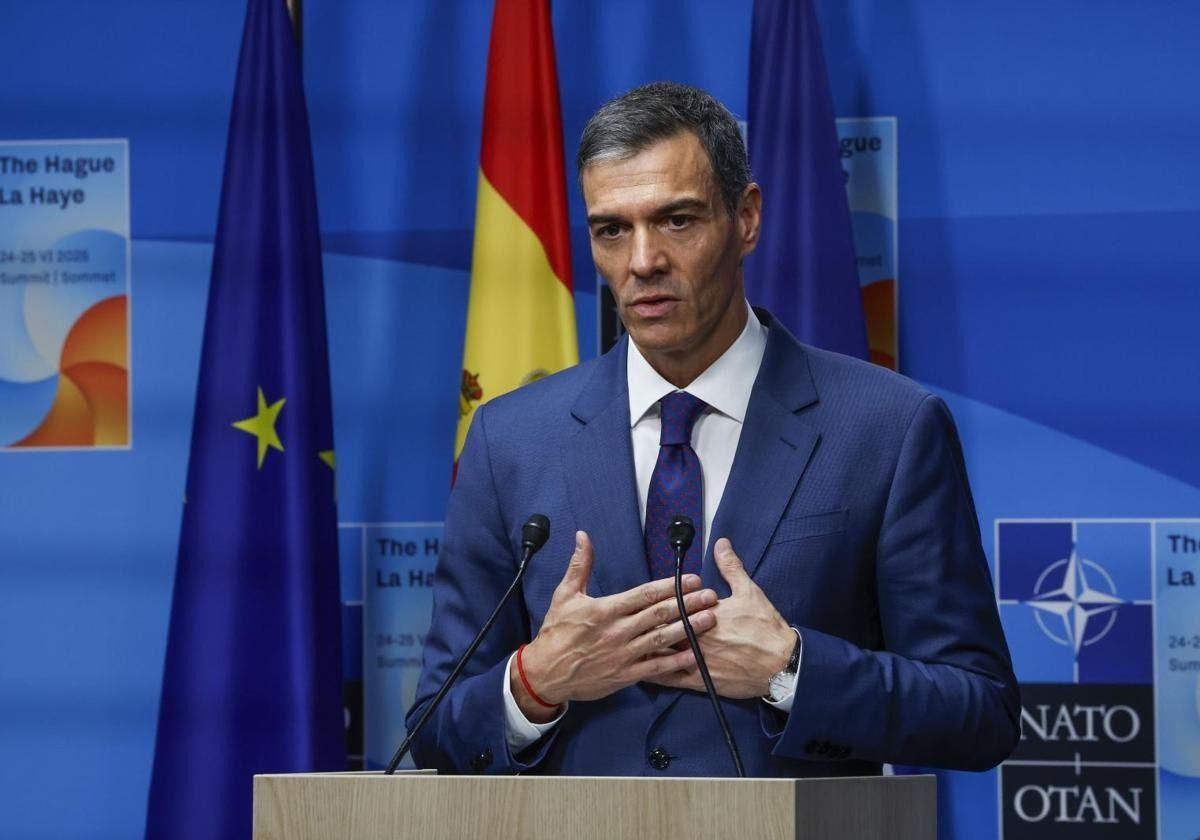Sánchez responds to Trump: 'Spain is always the solution, not the problem.'
The Prime Minister argues that his negotiations with Rutte have made it possible to preserve Nato unity and guarantee that Spain will not have to spend more than 2.1% of its budget on defence
Pedro Sánchez leaves the Nato summit in The Hague with his head held high. The Prime Minister has responded to Donald Trump's criticism of Spain's reluctance to commit to a defence expenditure of 5% of GDP that, contrary to his claim that our country is "a problem" for the Atlantic Alliance, "it is always the solution." In this case, he cited Spain as the architect of an agreement that has allowed the meeting to end with the signing of a unanimous declaration while "safeguarding" the national interest. "After this summit, Nato wins, Spain wins, and security and the welfare state win."
Like the rest of the allies, Spain has signed a document that establishes a commitment to invest 5% of GDP in defence by 2035 (3.5% of hard spending to meet capacity targets and 1.5% to protect infrastructure security and other spending on security), something the US president has been demanding for months under threat of leaving Nato. However, Sánchez insists that Spain will never go beyond 2.1% of GDP, a figure he has described as "sufficient, realistic and compatible" with the Spanish social model.
In a press conference following the working meeting held yesterday morning - in which Sánchez was unusually isolated - the PM recalled that the negotiations held in the previous weeks with Nato Secretary General Mark Rutte guarantee Spain this "flexibility" so it can avoid being bound by a commitment that would entail, he said, disbursing 300 billion euros, raising taxes and diverting resources currently allocated to social spending or ecological transition. These were issues that he promised in parliament not to touch.
The Spanish government is holding onto what it calls a "triple lock" to insist that their position is protected: the ambiguity of the approved text, which makes no reference to "all" allies, the letter in which Rutte confirmed that Spain could follow its own "sovereign path" as long as it complies with the capacity target approved on 5 June and, lastly, the PM's response, in which he stated that only under that premise would Spain join the agreement. However, this has not prevented Alberto Núñez Feijóo (national leader of Spain's PP party) from questioning it.
"If Spain had another prime minister today, he would have signed a 5% agreement and it would be an outright mistake," said Sánchez, attacking Feijóo.
Sánchez has used the PP leader's reproaches to boast of this audacious move that he knows could yield political dividends at what is an extremely difficult time in the legislature, with his parliamentary majority hanging by a thread as a result of the corruption scandal involving two of his most trusted colleagues, Santos Cerdán and José Luis Ábalos. "If there were another prime minister today, Spain would have signed it", he mused, "and it would be an outright mistake."
The Spanish government's stance has earned it reproaches from some countries beyond the United States. There has also been some praise, not without irony, such as that of the Belgian prime minister, Bart De Wever who, before the summit, had expressed his reluctance to invest more than 2% in defence, but who then declined to engage in the battle in which Sánchez is consolidating his role as the nemesis of the head of the world's leading power. "It would be great to see that what is estimated to be 3.5% can be achieved with 2.1%, as Pedro Sánchez has said. If he can do it, he's a genius. And of course, genius inspires", said De Wever.
Sánchez leaves The Hague without even greeting Trump. He has claimed it was purely a "coincidence" that he was unable to do so, but the truth is that, in the images prior to the main meeting, he could be seen avoiding any contact and displaying a very different attitude than his usual one at meetings of this type, where, using his fluent English, he usually takes the opportunity to converse with other leaders. This was not the case here. This time, he chose to isolate himself and sit alone in his chair waiting for the discussion to begin.
Government sources maintain that, behind closed doors, "no ally has reproached Spain for anything" and that the prime minister of Latvia has even expressed his gratitude to Spain for the presence of Spanish troops on its border, while others have welcomed the "flexibility" included in the agreed declaration. However, Trump, who celebrated the fact that "most of the allies have committed to the 5%", also pointed out that it was not all of them. Then, in his subsequent press appearance, he dropped the bombshell by threatening to punish Spain commercially for its rebelliousness.
Rutte, however, has backed Spain and described it as a "serious" ally. This is despite his questioning two days ago whether it would be possible to meet military capability targets with only 2.1% of GDP, which Sánchez believes is necessary for the Spanish armed forces. Following the agreement, he clarified his opinion: "We can agree to disagree, they believe they can reach their capability targets with 2.1% spending. Nato says it has to be 3.5%, as for all other allies."

